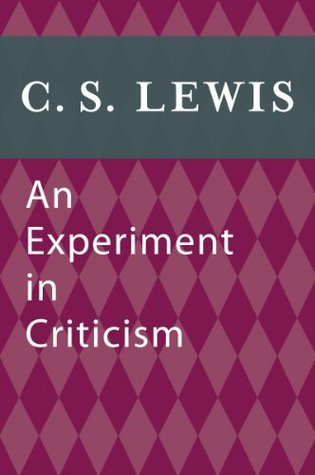More on this book
Community
Kindle Notes & Highlights
Those who read great works, on the other hand, will read the same work ten, twenty or thirty times during the course of their life.
literary people are always looking for leisure and silence in which to read and do so with their whole attention. When they are denied such attentive and undisturbed reading even for a few days they feel impoverished.
the first reading of some literary work is often, to the literary, an experience so momentous that only experiences of love, religion, or bereavement can furnish a standard of comparison. Their whole consciousness is changed. They have become what they were not before.
Now the true reader reads every work seriously in the sense that he reads it whole-heartedly, makes himself as receptive as he can.
Real appreciation demands the opposite process. We must not let loose our own subjectivity upon the pictures and make them its vehicles. We must begin by laying aside as completely as we can all our own preconceptions, interests, and associations.
The first demand any work of any art makes upon us is surrender. Look. Listen. Receive. Get yourself out of the way. (There is no good asking first whether the work before you deserves such a surrender, for until you have surrendered you cannot possibly find out.)
The distinction can hardly be better expressed than by saying that the many use art and the few receive it.
A work of (whatever) art can be either ‘received’ or ‘used’. When we ‘receive’ it we exert our senses and imagination and various other powers according to a pattern invented by the artist. When we ‘use’ it we treat it as assistance for our own activities. The one, to use an old-fashioned image, is like being taken for a bicycle ride by a man who may know roads we have never yet explored. The other is like adding one of those little motor attachments to our own bicycle and then going for one of our familiar rides.
The best safeguard against bad literature is a full experience of good; just as a real and affectionate acquaintance with honest people gives a better protection against rogues than a habitual distrust of everyone.
A work of literary art can be considered in two lights. It both means and is. It is both Logos (something said) and Poiema (something made). As Logos it tells a story, or expresses an emotion, or exhorts or pleads or describes or rebukes or excites laughter. As Poiema, by its aural beauties and also by the balance and contrast and the unified multiplicity of its successive parts, it is an objet d’art, a thing shaped so as to give great satisfaction. From this point of view, and perhaps from this only, the old parallel between painting and poetry is helpful.
Literary experience heals the wound, without undermining the privilege, of individuality. There are mass emotions which heal the wound; but they destroy the privilege. In them our separate selves are pooled and we sink back into sub-individuality. But in reading great literature I become a thousand men and yet remain myself. Like the night sky in the Greek poem, I see with a myriad eyes, but it is still I who see. Here, as in worship, in love, in moral action, and in knowing, I transcend myself; and am never more myself than when I do.


